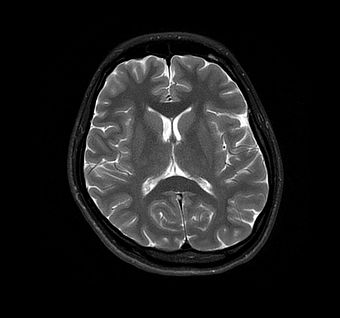What Is An MRI of the Brain?
 Magnetic resonance imaging (MRI) is a noninvasive test that physicians use to diagnose and treat medical conditions. MRI uses a powerful magnetic field, radio frequency pulses and sophisticated computers to produce detailed pictures of organs, soft tissues, bone and virtually all other internal body structures. The images can then be examined on a computer monitor, transmitted electronically, or copied to a CD. MRI does not use ionizing radiation (x-rays). Detailed MR images allow physicians to evaluate various parts of the body and determine the presence of certain diseases. Currently, MRI is the most sensitive imaging test of the head (particularly in the brain) in routine clinical practice.
Magnetic resonance imaging (MRI) is a noninvasive test that physicians use to diagnose and treat medical conditions. MRI uses a powerful magnetic field, radio frequency pulses and sophisticated computers to produce detailed pictures of organs, soft tissues, bone and virtually all other internal body structures. The images can then be examined on a computer monitor, transmitted electronically, or copied to a CD. MRI does not use ionizing radiation (x-rays). Detailed MR images allow physicians to evaluate various parts of the body and determine the presence of certain diseases. Currently, MRI is the most sensitive imaging test of the head (particularly in the brain) in routine clinical practice.
MR imaging of the head is performed for a number of abrupt onset or long-standing symptoms. It can help diagnose conditions such as:
- Brain Tumors
- Stroke
- Infections
- Developmental Anomalies
- Hydrocephalus — dilatation of fluid spaces within the brain (ventricles)
- Causes of Epilepsy (Seizure)
- Hemorrhage in Selected Trauma Patients
- Certain Chronic Conditions, such as Multiple Sclerosis
- Disorders of the Eye and Inner Ear
- Disorders of Pituitary Gland
- Vascular Problems, such as an Aneurysm (a Bubble-like Expansion of the Vessel), Arterial Occlusion (Blockage) or Venous Thrombosis (a Blood Clot within a Vein)
- Physicians also use the MR examination to detect brain abnormalities in patients with dementia, a disorder that can cause confusion or memory loss.
*Information courtesy of Radiologyinfo.org


